OP-ED
South Africa’s missing children (Part Two): Dead, or still not found
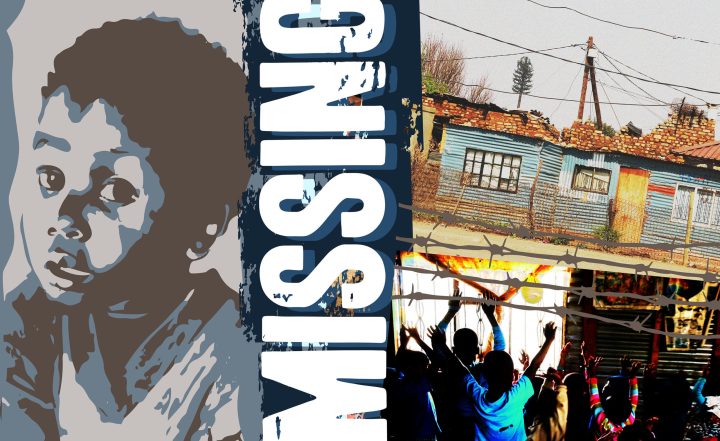
Statistics from Missing Children SA show that 23% of missing children are not found, or are found deceased. Until they are located, we cannot know for certain why they went missing, but experts propose that some are kidnapped for childless women, others taken for their body parts, some are runaways and others have been trafficked for child labour or sexual exploitation. These are their stories.
Read Part One here
Accessing missing children statistics in South Africa is notoriously difficult. The last officially published figures were released by the South African Police Services (SAPS) in 2013 and showed that 1,697 children go missing every year. In other words, in 2013, a child went missing every five hours in South Africa. Unaudited SAPS figures from 2016 revealed a decrease in these numbers to 866, but despite requests, the SAPS did not provide updated figures for this article.
Given that missing children cases are almost certainly under-reported though, the more significant figure is how many of these children remain missing.
Missing Children SA explain that in 77% of their missing children cases, the child is found or returns home. The remaining 23% are either found deceased or fall into the category, “still not found”.
SAPS Missing Persons Bureau’s 2014 statistics show that of the cases reported between 2011 and 2013, 754 children were still missing. Dr Marcel van der Watt, a former member of the Hawks with almost 20 years’ experience in human trafficking and organised crime, now from the National Center on Sexual Exploitation, says the number is significant. In a 2018 study, he found that 3,957 children were unaccounted for, or still missing for the period 2000 to 2015.
Police stats from 2000 to 2020 provided for his ongoing research revealed that 94,252 people were reported missing in South Africa, of whom 16,151 are children. Van der Watt confirmed that 62,707 of these cases were cancelled, leaving 31,545 (33%) active.
Although the SAPS did not disaggregate the open cases, van der Watt maintains that the number of children that are unaccounted for or still missing, has probably exceeded 4,000.
Stated differently, 25% of the children who have been reported missing over the last twenty years have not been found.
It’s a staggering number, and behind it are thousands of families whose lives were forever changed by a moment. But, in a country where children’s stories often go unheard, even around issues that directly affect them, the voices of children “still not found” or found deceased are particularly silent.
They cannot narrate where they are or what has happened to them. In their absence, their stories have been pieced together from eye-witness accounts.

According to Missing Children SA, 23% of its missing children cases the child is either found deceased or falls into the ‘still not found’ category.
In part one of this four-part series on South Africa’s missing children, we met Clara Masuluke six months after her daughter Akani disappeared. Described by her mother Clara as a nice girl and a fast learner, Akani was just six when she went missing from Protea South squatter camp on a Saturday evening in early 2017.
As Clara recalls the last time she saw her daughter, she clutches a faded and damaged photograph of the petit Grade 1 pupil dressed in her oversized school dress. The photo, which was taken the day before Akani disappeared, is the only one Clara has left of her daughter. The other is somewhere in the police station where she was reported missing.
An emotional Clara describes how on that Saturday afternoon, 4 February 2017, Akani was playing in the local circle, an open space enclosed by shacks, with friends and her older sister, Minkeso who was ten at the time. Clara was busy with her washing, so the children popped back home periodically so she could see they were okay. Akani made her last stop at home at 4pm.
It was a while before Clara realised that she hadn’t seen Akani recently and went looking for her. Akani’s older sister and other local children playing at the circle confirmed that she was “around”. “She was here,” they said, but Clara couldn’t find her at the circle or with any of the neighbours.
Eventually, a retired local Community Policing Forum (CPF) member phoned the police, and other CPF members took a frantic Clara to the local police station to report Akani missing. But when she got there, she was told that the people who work with missing person’s cases were not available.
Although the community spent the weekend searching for the child, the police didn’t come to look for Akani or provide a reference number until Monday 6 February, more than 36 hours after she first went missing.
The delay was crucial. Not only did police miss most of the golden window for finding Akani, but all information communicated to the public about the case, including the Pink Ladies missing poster and media reports incorrectly stated that she had gone missing on Monday the 6th.
Unsatisfied, community members marched to the police station to ask police to bring sniffer dogs. They also picked out a suspect because Akani was seen playing around his house. Days later, the dogs came, but searches, which were cursory, proved futile.
It fell to the CPF to drive the investigation, and after rumours that the community had seen children playing in Zuurbekom (an area 5km south of Clara’s house), Clara, her sister and the chairperson of the CPF went to search there one night. Despite requests, they went without most of their search party, who were not allowed to accompany them because the police said they “would be noisy”.
Clara says that the police investigated one house and then left.
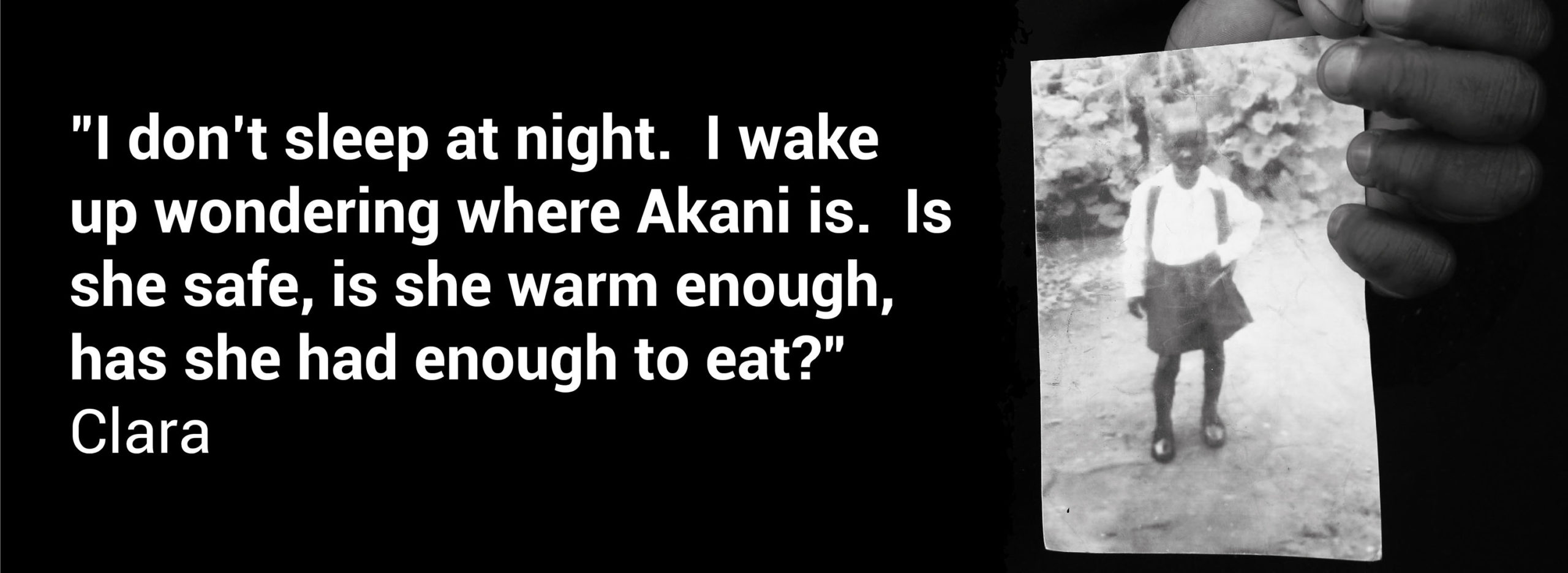
Although the community continued the search, Akani has never been found. When asked if the police kept her updated on the case, Clara said no, she was told that if she “had any suspects or heard anything”, she must come and tell them.
In 2021, when Clara returned to the police station to get information for a Missing Children SA poster, she was told by police that they had a reference number for her but, they would only “give her a case number or open a file when Akani’s body was found”.
Like Akani, Siphesihle Dlamini went missing in 2017. She disappeared from a church in Amandawe on the South Coast of KwaZulu-Natal on New Year’s Eve, a month after she celebrated her third birthday.
In an interview, her father Mxolisi and mother, Thabisile described her as a talkative, funny and bubbly child who had a gift for cheering people up when they were sad. Touchingly, she began composing songs about her parents and singing as soon as she could speak. Nicknamed the Tina Turner of the house, she adored her daddy, and her mom jokes that she had him wrapped around her little finger.
On 31 December 2017, Thabisile made the fateful decision to attend a church service before leaving to spend New Year’s Eve with Mxolisi, who hadn’t seen his family since 12 December. At the end of the service, the pastor invited visitors to the front. Leaving her daughter and her handbag on her chair surrounded by congregants, Thabisile and her aunt spent about ten minutes greeting and praying with the pastor. When she returned, her handbag was still on her chair, but there was no sign of Siphesihle.
Frantic to find her, Thabisile ran outside of the church to search, but without success. While she was standing there, a young girl asked her why she was crying. When she explained, the girl told her not to cry and that her older sisters had taken Siphesihle to buy chips at the local tuck shop.
Relieved, Thabisile confirmed the story with the two older girls who said that they had left the toddler at the tuck shop to walk back to the church. But there was no sign of Siphesihle outside the gates, and efforts from the congregants and community members to find her were unsuccessful.
The police were called, and together with sniffer dogs, they combed the church premises and car park. Thabisile looked for her daughter well into the night while an increasingly anxious Mxolisi waited hundreds of kilometres away for news of their daughter.
Although police were on the scene fairly soon after Siphesihle went missing, some of their decisions were bewildering. Mxolisi says that the investigating officer was certain that he and Thabisile were to blame for the child’s disappearance and not only were they subjected to a polygraph, but while efforts were concentrated on them, police seemingly disregarded some vital evidence.
The couple understood the scrutiny, local police had recently dealt with a similar case where the parents were complicit. Police also told Siphesihle’s parents that kidnappings were never opportunistic which, given that no one knew that Thabisile was going to church that morning, narrowed the pool of suspects dramatically.
But regardless of the reasons, the police’s myopic perspective may have resulted in them missing the real perpetrator. When questioned, all three girls swore that they had never seen the child, and their statements were taken at face value.
Eventually, the investigating officer, who the family say was also rude and abusive to Siphesihle’s desperate mother, was removed from the case.
There are other odd things about the story. When the couple returned to the area weeks later to put up missing child posters, the community was bemused, telling them that the pastor’s wife had told everyone that the child had been found.
Angry community members shut the church down as a result.
Siphesihle’s disappearance provoked a wave of sympathy across the country. Within weeks, a Facebook group dedicated to finding the child had thousands of members, “wear pink for Siphesihle” days were organised, posters made and distributed, money was provided for a private detective and a R40,000 reward offered for her safe return. But to no avail, there is no trace of her.
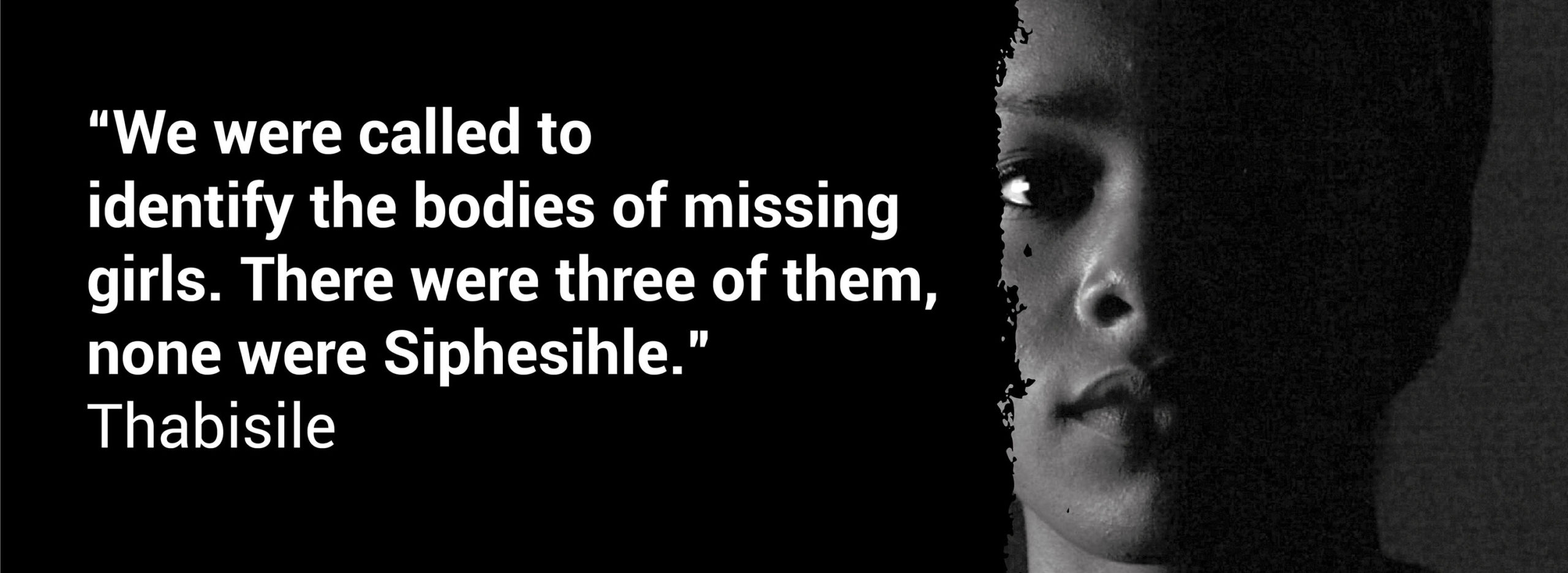
Over the years, the couple has had to deal with the compounded trauma of being called to identify the bodies of missing children that could have been their daughter. “There were three of them. None were Siphesihle”, the parents said. Pictures sent to them of living children were also not a match.
Neither Mxolisi nor Thabisile have any idea what happened to her. They are only certain of two things, Siphesihle wouldn’t have gone anywhere without her parents, so the theory that she “wandered off” is unlikely, and she couldn’t wait to see her daddy.
Almost four years later, he and Thabisile face the prospect of never seeing her again.
It isn’t just parents who are affected by the loss of a child, siblings are too. Caroline Selepe has spent her whole life believing that she would be the one to find her brother Tebogo, who was kidnapped about 35 years ago when he was just three months old.
Caroline says that on the day he went missing, Tebogo was on his mother’s back while she did the family washing at their home in Diepkloof, Soweto. He was crying uncontrollably when the girlfriend of their neighbour said that she was going to the local tuckshop to buy chips and offered to take him with her so Caroline’s mother could finish her washing.
Although she was one of many females who visited her neighbour’s house, and Caroline’s mother didn’t know her, she was a familiar and friendly face and her kindness at a time when the baby was inconsolable was compelling.
The family never saw Tebogo or the neighbour’s girlfriend again.
Caroline, who is estranged from her older siblings knows very little about the story. Her mom fell ill when she was 11, and she nursed her until she died a year later. What she does know is that her mother never recovered from the loss.
Caroline said that after Tebogo went missing, they moved to Alexandra township and she would occasionally slip out to play with her friends in the street. If her mother caught her, she would become hysterical and beat her. She also remembers the trips to the sangomas who all said the same thing, Tebogo was in a house, but they couldn’t see the number, and Caroline would be the one to find him.
It’s a pressure that Caroline experiences tangibly, and she hopes that one day she will have enough money to hire a detective to find her brother. But in the interim, even though she never met him, Tebogo’s loss weighs heavily.
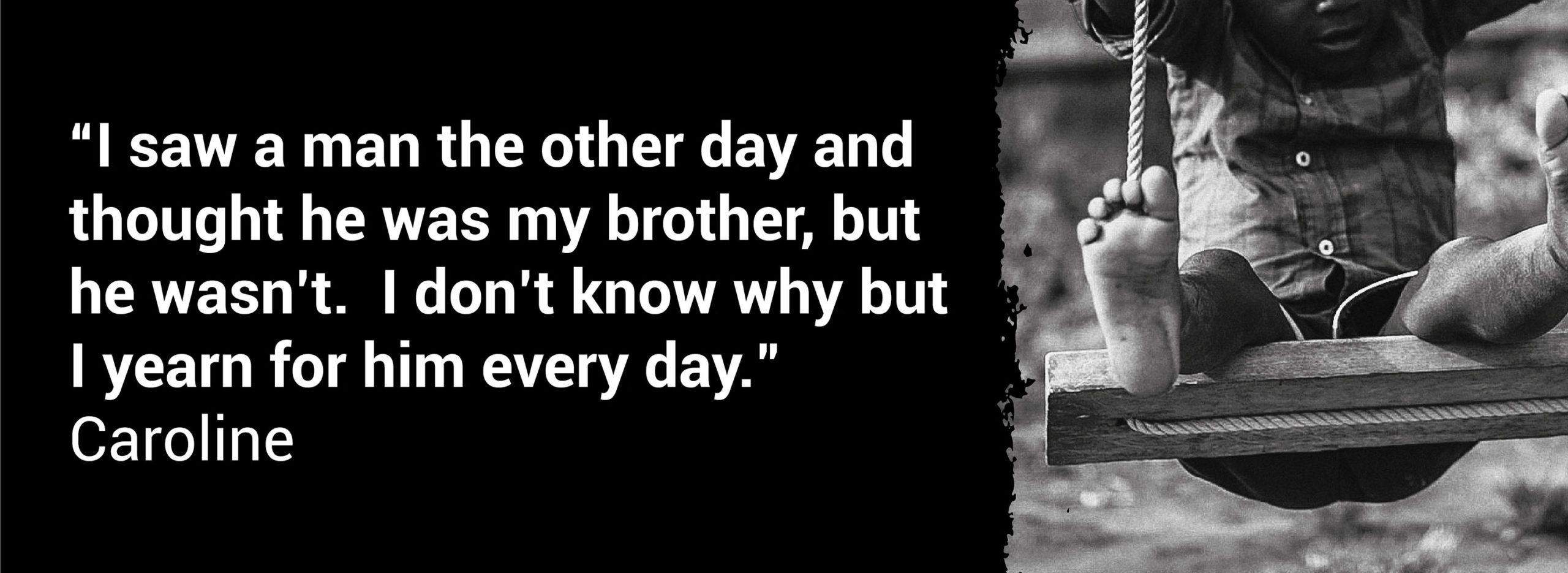
Now that she is a mother, it has made her fearful that something will happen to her children.
Caroline says that she and Tebogo were the only siblings who shared a father, and she speculates that they may even have been twins. His absence has left a lifelong hole in her heart. “I saw a man the other day and thought he was my brother, but he wasn’t. I don’t know why, but I yearn for him every day”.
Unbeknownst to Caroline, the kidnapping of one twin is a common theme in stories about missing children. Veronisha, whose identical twin Veronique was kidnapped by the family’s nanny 32 years ago when she was 11 months old, has had her life defined by the loss of her twin.
Veronisha describes the day that their nanny, “Beauty”, newly hired on the recommendation of a family friend, but whose identity was never established (she told the family that her ID book was at home in KwaZulu-Natal) left the family home in Eldorado Park with Veronique on her back, and never returned.
At the time when the kidnapping occurred, there was still a waiting period for reporting missing children. Police sent the family away, despite multiple eyewitness accounts of Beauty carrying the baby on her back. Not realising that Veronique was a twin, neighbourhood school children assumed that the child had been returned safely when they saw Veronisha.
Although the family did their best to look for Veronique, by the time the police were persuaded to waive the waiting period and open a case, there was no sign of the baby or her nanny.
Veronisha explains how the loss of her sister, who was older by a few minutes and described as the serious twin, dominated her childhood: “I didn’t want to move her bed out of my room in case Veronique came back, so every night of my childhood, I slept with an empty bed in my room. My mother won’t sell the house either. She stays in case someone finds Veronique and brings her back. She’s even kept her landline because the number was included in so many news articles. I guess she hopes that one day she will get a call to say that Veronique is okay”.
Now a mom of a little girl the same age as Veronique was when she went missing, Veronisha describes how her sister’s loss is a reality that she lives with daily. Birthdays are particularly difficult, not just because she should be sharing the day with her sister, but because Veronique went missing at the beginning of March, their birthday month. It’s the reason why Veronisha went 21 years without celebrating.
But she remains hopeful that her sister is alive. Now her greatest worry is that her mom is getting older and may die without any closure. It’s what happened to her father, and for Veronisha, the thought of losing her mom before her twin is found is devastating.
When asked what she would say to Beauty if she could talk to her, she explains that although she hated her for years, now she would forgive her because “only she knows why she did what she did, and why she destroyed our family”.
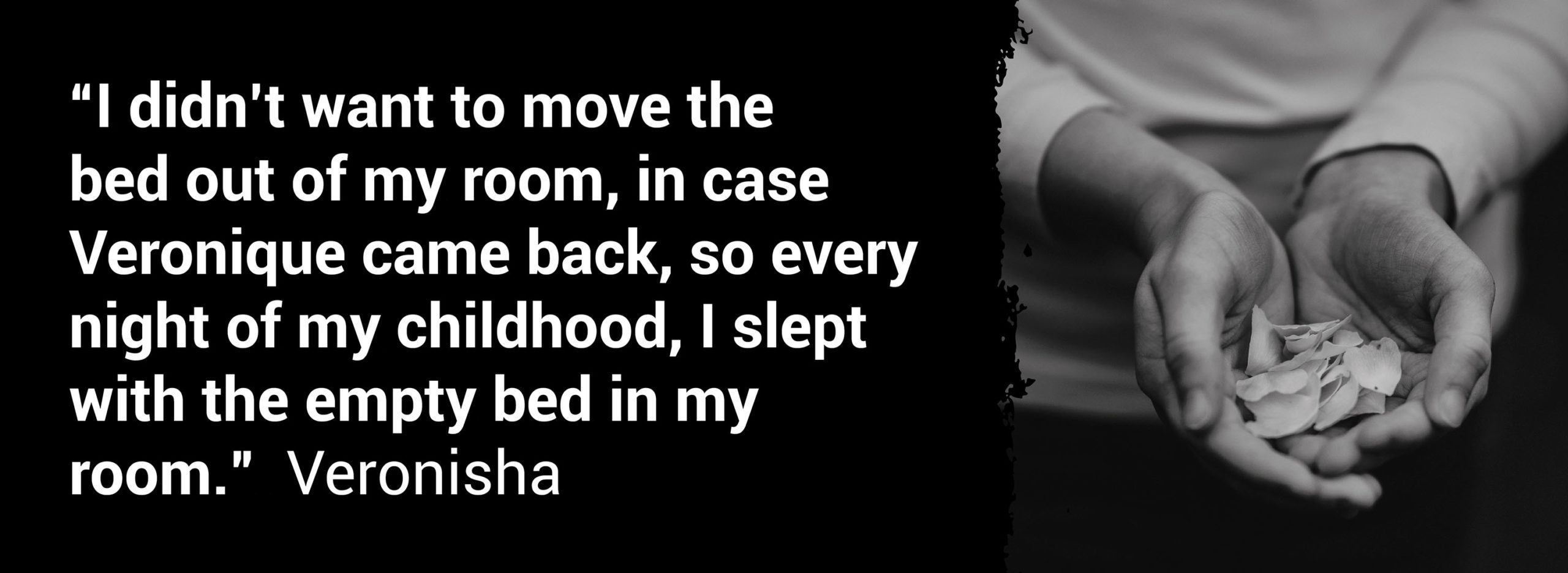
Given that Siphesihle, Akani, Veronique and Tebogo have never been found, it’s impossible to know what happened to them. But their families still hold onto the possibility that they are alive.
Not all children survive their ordeal though.
Mlando Zuma was described by his mother Sonto as a child that liked playing at home. “He would sometimes take his bicycle out for a ride around the house or nearby, but he would not disappear for more than 30 minutes without us knowing his whereabouts,” she said.
He was last seen on 18 June 2021, playing outside the house of the local sangoma in Dambuza, KwaZulu-Natal. Sonto said that she had left her son at the sangoma’s house while she went to the hospital. When she returned, she was told that her son had gone missing.
According to his mother, Mlando had been playing with his older brother and a toy car when he vanished.
A week later, his lifeless body was found in a septic tank at the sangoma’s house. Although there are no further details about the case at present, community members torched the house where his body was found.
Mlando was four years old when he died.
Keleabetse Seleka, a Centurion teenager, was last seen on 28 November 2017 on her way to Atteridgeville after she told her friends that she had gone to meet a “blesser” who had befriended her on Facebook, after he posted that he wanted a curvy and chubby woman to bless. According to her friends, the 15-year-old responded, hoping for Peruvian hair, gadgets, free data and an exotic holiday or “baecation”.
Instead, she was poisoned after eating a local bunny chow, known as spathlo, and then, when she didn’t die quickly enough, was strangled for her cell phone and other valuables. Her body, which was dumped in a pit toilet at Mshongoville informal settlement in Atteridgeville, was found on 28 December, a month after she went missing.
The agony of finding a missing child dead is demonstrable in Mlando and Keleabetse’s stories. But the ongoing pain of wondering what has happened to a child “still not found” is equally unbearable for some families.
Noluthando’s daughter Amathi, went missing from Gqberha, Eastern Cape, 14 years ago. It was 6 November 2007 and Amathi, aged three and a half at the time, was in the care of a family member who was “watching her” while her mother worked the evening shift at a local restaurant. Describing the day when Amathi went missing, Noluthando broke down. She wasn’t able to complete the interview.
The pain of Akani’s loss has left Clara wishing that she had never been born.
“I don’t sleep at night”, Clara says, “I wake up wondering if Akani is okay. Is she safe? Is she warm enough? Has she had enough to eat? Some days, it feels too much.” Her photo of Akani is damaged and scuffed from frequent handling. That, her birth certificate and a scrap of paper with a police reference number and an official stamp is all she has left of her daughter. And somewhere in a police station, her only other photo is gathering dust.
Desperate as these stories are, all of the children in this article are loved and looked for. It isn’t always the case. Part 3 of the four-part series focuses on children who are gone, but no one has even reported them missing. These are South Africa’s ghost children. DM
- Most questions put to the SAPS about the scope and specifics of the country’s missing children problem went unanswered at the time of going to print. However, no questions were posed about the historical handling of specific missing children cases to avoid compromising ongoing investigations now being handled by different investigating officers.
These articles focus on children who have gone missing, on survivors and those not found or found deceased. While the names of survivors and their parents have been changed to protect their identities, the names of children still missing are included, along with photos and missing person’s posters, in the hopes someone knows where they are. If you have any information, please contact Bianca van Aswegan from Missing Children SA on 072 647 7464 or SAPS Crime Stop on 086 000 10111.
This story was published with the support of Media Monitoring Africa and UNICEF as part of the Isu Elihle Awards Initiative.
Design by Kerry Nash. Portrait of Siphesihle: Simmone Livingston Laubenheimer.



















 Become an Insider
Become an Insider
Comments - Please login in order to comment.